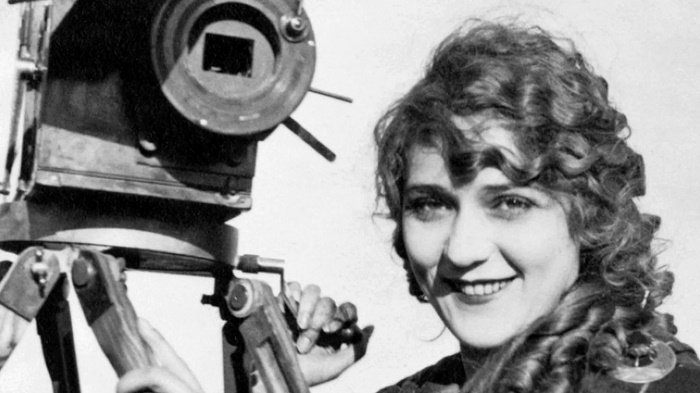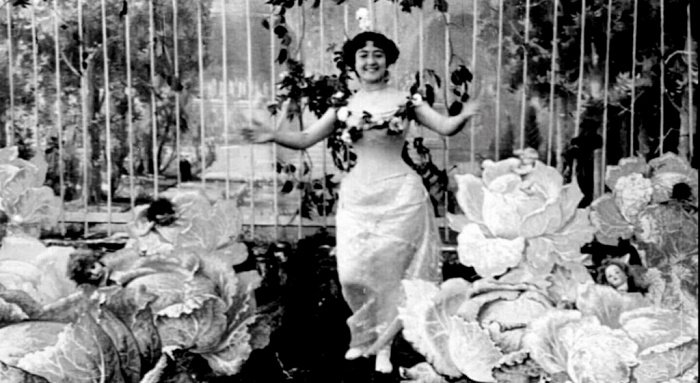Alice Guy-Blaché, desconocida iniciadora del cine de ficción | Alice Guy-Blaché, unknown initiator of fiction cinema
Son 150 años del nacimiento –1 de julio de 1873— de Alice Guy-Blaché, tenida hasta ahora como la primera cineasta. Es un aniversario que el mundo del cine y los cinéfilos deberíamos celebrar. Alice Guy estuvo olvidada e invisibilizada, como se dice ahora, hasta hace poco, en lo que seguramente influyó su condición de mujer; no sólo le fue negado su carácter pionero, sino que incluso algunos de sus filmes fueron atribuidos a otros. Fue a finales del siglo XX cuando comenzó a ser reconocida. Con este modesto post le rindo mi homenaje.
============
It is 150 years since the birth —July 1, 1873- of Alice Guy-Blaché, until now considered the first female filmmaker. It is an anniversary that the world of cinema and cinephiles should celebrate. Alice Guy was forgotten and invisibilized, as they say now, until recently, which surely influenced her condition as a woman; not only was her pioneering character denied, but even some of her films were attributed to others. It was at the end of the 20th century when she began to be recognized. With this modest post I pay tribute to her.

Alice Guy, como puede leerse en los textos de referencia que indico, realizó su primer filme de ficción, es decir, no documental, en 1896, unas semanas antes —se dice- que Georges Meliés, tenido como el padre del cine de ficción. Fue, sin duda, una mujer emprendedora y arrojada, pues se atrevió a asumir en su tiempo, de grandes limitaciones para la mujer, el reto de hacer realizaciones fílmicas cuando apenas el cine estaba naciendo (recuérdese que fue en 1895 cuando los hermanos Lumière patentan el cinematógrafo —cámara y proyector a la vez— y efectúan la primera exhibición cinematográfica).
Desde su inicial condición de secretaria —oficio muy propio de las mujeres entonces— de quien fuera un empresario de la fotografía, León Gaumont, pasó a ser no sólo directora de cine, sino también productora (inaugura este oficio), y la primera persona cuya vida económica se mantiene gracias a esa dedicación. Al parecer rodó cerca de 1000 filmes, suponemos, pues no hay información precisa, que se incluyen todos sus intentos y logros como cineasta y como productora. Fue también actriz en algunos de sus filmes, en lo que influyó su procedencia artística en el teatro. Además, creó empresas productoras de cine tanto en Francia como en EEUU.
============
Alice Guy, as can be read in the reference texts I indicate, made her first fiction film, that is, non-documentary, in 1896, a few weeks before - it is said - Georges Meliés, considered the father of fiction cinema. She was, undoubtedly, an enterprising and daring woman, as she dared to take on the challenge of making films in her time, a time of great limitations for women, when cinema was just being born (remember that it was in 1895 when the Lumière brothers patented the cinematograph -camera and projector at the same time- and made the first cinematographic exhibition).
From her initial position as a secretary -a job very typical of women at that time- of a photography businessman, Leon Gaumont, she became not only a film director, but also a producer (she inaugurated this profession), and the first person whose economic life is maintained thanks to this dedication. Apparently she shot about 1000 films, we assume, as there is no precise information, that all her attempts and achievements as a filmmaker and as a producer are included. She was also an actress in some of her films, which was influenced by her artistic background in theater. In addition, she created film production companies both in France and in the USA.

Cuando ponderamos su desempeño en el cine, apreciamos a una mujer de una personalidad admirable en todos los sentidos. Sin llegar a ser una feminista, defendió su condición de mujer dedicada al arte y al cine en particular.
Los estudiosos destacan sus contribuciones al cine, de gran relevancia en los primeros pasos del que sería considerado el “séptimo arte”. Aunque tenemos un acceso limitado a su obra, ya que muchos de sus filmes se perdieron, podemos estimar aportes en el uso de los efectos especiales, de las sobreimpresiones y del decorado. Así también, del aprovechamiento de la ironía y el humor, y de la diversidad de géneros apenas nacientes como el fantástico, la ciencia ficción, el histórico, el religioso, el amoroso, y los de historias cotidianas. Pondré enlaces a algunos ejemplos, en general cortos.
============
When we ponder her performance in film, we appreciate a woman with an admirable personality in every sense. Without becoming a feminist, she defended her condition as a woman dedicated to art and to cinema in particular.
Scholars highlight her contributions to cinema, of great relevance in the first steps of what would be considered the “seventh art". Although we have limited access to her work, since many of her films have been lost, we can estimate her contributions in the use of special effects, overprints and scenery. Also, the use of irony and humor, and the diversity of barely nascent genres such as fantasy, science fiction, historical, religious, love, and everyday stories. I will put links to some examples, generally short.
============
En lo fantástico, con cierto toque de humor, sin duda, su primer filme: El hada de los repollos (1896) | In the fantastic, with a certain touch of humor, undoubtedly his first film: The cabbage fairy (1896):
En el uso de efectos especiales, y también de las sobreimpresiones, destacaría Fausto y Mefistófeles (1903) | In the use of special effects, and also of overprints, I would highlight Faust and Mephistopheles (1903):
En decorados, igualmente con utilización de las sobreimpresiones, su filme Nacimiento, vida y muerte de Cristo (1906) | In scenery, also using overprints, his film Birth, life and death of Christ (1906):
Un filme de insoslayable carácter humorístico es La mujer adhesiva (1906) | A film with an unavoidable humorous character is The Adhesive Woman (1906):
Y finalmente, su aguda ironía, expresada también como humor, en Las consecuencias del feminismo (1912) | And finally, his sharp irony, also expressed as humor, in The Consequences of Feminism (1912):
Referencias | References:
https://es.wikipedia.org/wiki/Alice_Guy
https://en.wikipedia.org/wiki/Alice_Guy-Blach%C3%A9
https://historia.nationalgeographic.com.es/a/alice-guy-blache-pionera-olvidada-cine_17230
Un documental de valoración de la obra de Alice Guy en este enlace | A documentary film evaluating Alice Guy's work can be found at this link
En este vínculo varios de sus filmes | In this link several of his films.

Gracias por su lectura | Thank you for reading.



Congratulations @josemalavem! You have completed the following achievement on the Hive blockchain And have been rewarded with New badge(s)
You can view your badges on your board and compare yourself to others in the Ranking
If you no longer want to receive notifications, reply to this comment with the word
STOPCheck out our last posts:
Thanks, @hivebuzz.
You're amazing @josemalavem! Your daily posts are keeping Hive buzzing and making a difference.
Wow! Thank you very much. It's a great compliment.
https://leofinance.io/threads/josemalavem/re-leothreads-4dhgvttx
The rewards earned on this comment will go directly to the people ( josemalavem ) sharing the post on LeoThreads,LikeTu,dBuzz.